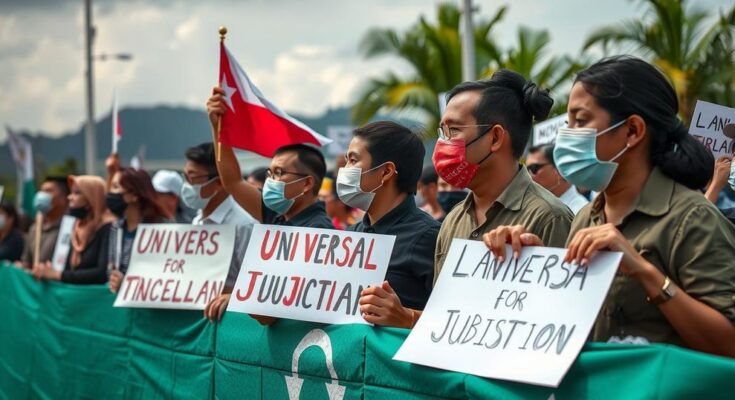Indonesia’s Constitutional Court is reviewing a petition to allow for universal jurisdiction to prosecute Myanmar’s military junta for human rights abuses following its coup. This change could empower Indonesia to pursue accountability for severe international crimes committed abroad. Legal advocates emphasize the necessity of this amendment in fulfilling Indonesia’s constitutional responsibilities towards global human rights protection.
Indonesia’s Constitutional Court is currently deliberating on a petition to amend a human rights law, which could empower the nation to prosecute members of Myanmar’s military junta for alleged human rights violations following their coup in February 2021. This petition, if approved, would enable Indonesia to apply universal jurisdiction, allowing its courts to undertake investigations and prosecutions of serious international crimes committed by foreign nationals outside its borders.
A nine-judge panel has temporarily paused to review suggested amendments to the petition. Among the petitioners are noted human rights advocates, including former Attorney General Marzuki Darusman and Busyro Muqoddas, former chairman of the Judicial Commission. The crux of their request is to remove the clause specifying that such tribunals can only prosecute Indonesian nationals, thereby opening the possibility for prosecuting foreign perpetrators for abuses occuring abroad.
Feri Amsari, attorney for the petitioners, expressed confidence that the court would move forward with the case, emphasizing that the application of universal jurisdiction aligns with Indonesia’s constitutional mandate of promoting global peace and justice. He stated, “The state has the responsibility to protect victims of massive and systematic crimes against humanity, regardless of national boundaries.”
Human rights organizations have highlighted the urgency of this petition, especially considering that Myanmar’s military junta is not a party to the International Criminal Court; hence, avenues for accountability are limited. It has been reported that since the coup, over 2,300 individuals have lost their lives due to military crackdowns. Activists assert that the implementation of universal jurisdiction could serve as a catalyst for addressing human rights abuses and fostering accountability in the region.
The plight of Myanmar has drawn attention from other ASEAN nations, who have criticized the junta for not adhering to a five-point plan established in 2021, which aimed to reduce violence and facilitate dialogue. Demands for stronger measures against Myanmar’s junta have intensified following recent executions of political prisoners.
Furthermore, activists view this potential legal change positively, anticipating that it would dismantle barriers to safeguarding human rights in Southeast Asia. As Andreas Harsono of Human Rights Watch noted, a ruling in favor of universal jurisdiction would serve as a significant warning to state officials regarding the necessity of respecting human rights in their decision-making processes.
Ultimately, should Indonesia adopt universal jurisdiction, it may set a notable precedent in Southeast Asia, influencing how countries approach cases of egregious human rights violations. The outcome in this instance may resonate far beyond Indonesia, emphasizing a collective regional responsibility in the pursuit of justice for victims of such abuses.
The debate over universal jurisdiction in Indonesia centers on the nation’s approach to international human rights law and its obligations in the face of egregious abuses committed abroad. Universal jurisdiction allows states to prosecute individuals for serious crimes against international law, regardless of where the crime has occurred or the nationality of the offenders or victims. The context for this particular case arises from Myanmar’s military coup, which has led to widespread human rights atrocities, prompting calls for accountability from the international community, including solutions beyond the scope of organizations like the International Criminal Court, to which Myanmar is not a party. This situation sheds light on broader themes of sovereignty, regional cooperation, and the steps nations can take to protect human rights in the absence of effective international mechanisms.
In summary, the potential for Indonesia to adopt universal jurisdiction represents a significant development in the landscape of international human rights law. As the Constitutional Court considers the petition, the implications of this legal framework could not only facilitate accountability for abuses committed by the Myanmar military but could also initiate a new phase of regional responsibility in safeguarding human rights. The actions taken by Indonesia may inspire other Southeast Asian nations to reckon with their roles in supporting justice for all victims, regardless of geographical or national boundaries.
Original Source: www.benarnews.org




